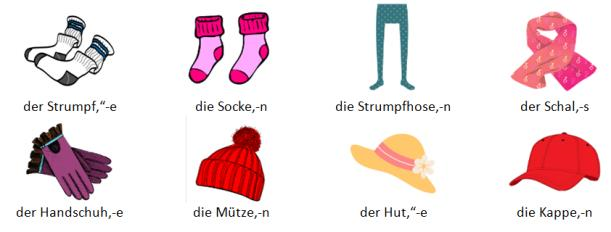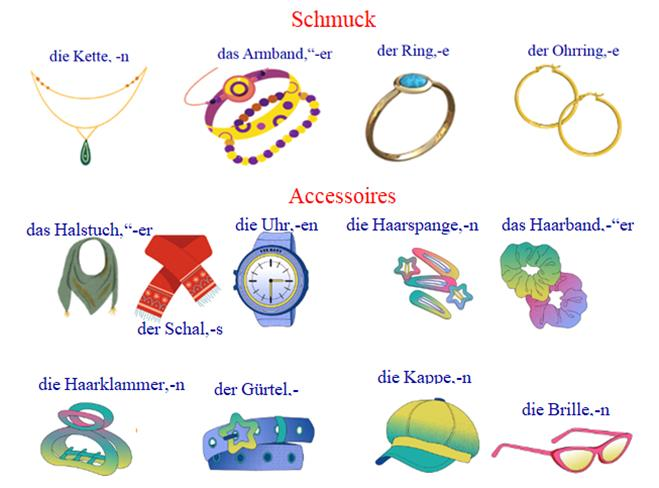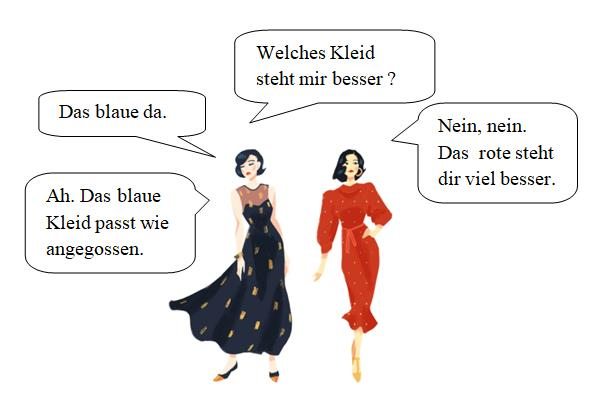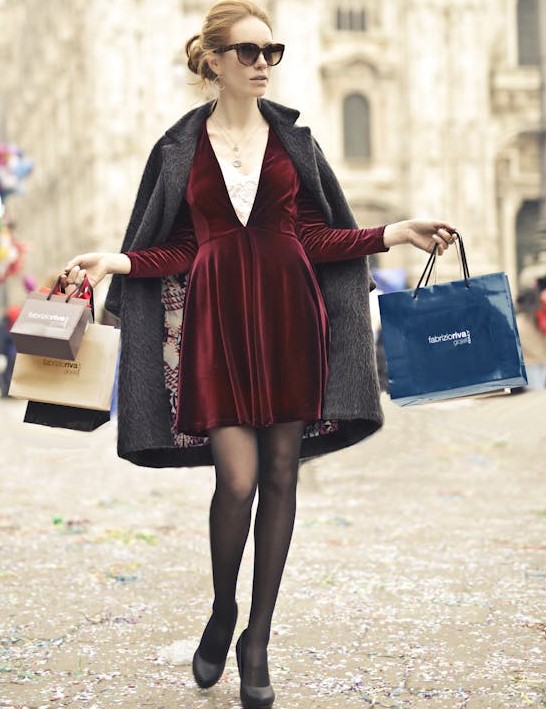When we are in a foreign country, it’s important to familiarize ourselves with the area and do some shopping. This lesson is a continuation of the “Clothing in German A1 / Kleidung” lesson. We will be discussing shopping and clothing in German again, but this time with a focus on jewelry and accessories. It will be interesting, do not leave the page. We will also learn important verbs related to this topic such as passen, stehen, sich anziehen, and sich ausziehen, and understand how to use them correctly and what they mean.
Thank you for reading this post, don't forget to subscribe!CONTENTS
Clothing in German
Warm – thin clothing
Jewelry and accessories
Zipper, button ….
Chic or not chic
Cheap and sold out
Buy and pay
Im Kaufhaus – Dialogs
Phrases/ Redemittel
Passen and stehen
anziehen/ausziehen
How do you get dressed?
Conjugation (sich an/aus ziehen)
Clothing in German
Wie heißen die Kleider?/ What are the clothes called?

der Cardigan, -s – cardigan
der/das Hoodie,-s – hoodie
die Jogginghose,-n – jogging trousers, sweatpants
das Sweatshirt,-s – sweatshirt
der Pullover,- jumper, sweater
der Geldbeutel,- purse, wallet
die Krawatte, -n – tie
der Gürtel,“- belt
die Bermudashorts (Pl) – bermuda shorts
Go to the lesson: Clothin in German A1/ Kleidung
Warm – thin clothing / Warme – Dünne Kleidung
![]() Es ist kalt. Zieh dich warm an. – It’s cold. Dress warmly.
Es ist kalt. Zieh dich warm an. – It’s cold. Dress warmly.
Es ist warm. Zieh dich dünn an. – It’s warm. Dress thinly.
Kannst du bitte meinen Geldbeutel in deine Handtasche stecken? – Can you please put my purse in your handbag?
Sie trug zur kurzen Hose blaue Nylonstrümpfe. – She wore blue nylon stockings with her shorts.
Pack viele Kleider ein. Wir werden dort campen. – Pack lots of clothes. We’ll be camping there.
Jewelry and accessories / Schmuck und Accessoires

Sie trägt goldenen Schmuck. – She is wearing gold jewellery.
Sie trug eine Spange im Haar. – She was wearing a barrette in her hair.
Ich möchte eine Kette aus Silber. Ich trage kein Gold. – I would like a necklace made of silver. I don’t wear gold.
Click on:
Grammar / Contents
Zipper, button …./ Reißverschluss, Knopf …
Deine Bluse ist aufgeknöpft. – Your blouse is unbuttoned.
Der Reißverschluss klemmt. – The zip is jammed/stuck.
Ja,ich weiß. Ich kann sie nicht zumachen. – Yes, I know. I can’t close it.
Der Knopf ist ab. – The button is off.
Die Tasche ist ohne Reißverschluss. Das gefällt mir nicht. – The bag has no zip. I don’t like that. Nimm diese Strümpfe. Sie sind aus Wolle. – Take these stockings. They are made of wool.
Flanell besteht aus 100 % Baumwolle. – Flannel is made of 100 % cotton.
Sind diese Schuhe aus echtem Leder? – Are these shoes made of genuine leather?
Chic or not chic / Schick oder nicht schick
Oh, dein neues Kleid ist wirklich modern und sehr schick. – Oh, your new dress is really modern and very chic.
Du musst etwas anderes anziehen. – You have to wear something else.
Dein T-Shirt ist total schmutzig. – Your T-shirt is totally dirty..
Den Mantel ist wirklich nicht mehr modern. – The coat is really no longer fashionable.
Ihre Bluse ist hässlich. – Her blouse is ugly.
Seine Kleidung ist fürs Büro zu bunt. – His clothing is too colourful for the office.
Wortschatz / Vocabulary
der Knopf, “-e – button
modern – modern
die Handtasche, -n – handbag
das Leder, – leather
hübsch – pretty
die Mode, -n – fashion
Cheap and sold out / Billig und ausverkauft
Die Iphones im Sonderangebot sind leider ausverkauft.- The Iphones on sale are unfortunately sold out.
Die Handyhülle können Sie gerne mitnehmen. Er ist gratis. – You are welcome to take the mobile phone case with you. It is free of charge.
Das Flugticket nach London war sehr billig. – The flight ticket to London was very cheap.
Die Eintrittskarten sind ausverkauft. – The tickets are sold out.
Schau mal, es ist ein Ausverkauf, lass uns in den Laden gehen.- Look, it’s a sale, let’s go to the shop.
Buy and pay / Einkaufen und bezahlen
Ich möchte gerne 500 Euro in Britische Pfund wechseln. – I would like to change 500 euros into British pounds.
In London kann man nur mit Kreditkarte bezahlen. – You can only pay by credit card in London.
Nur auf dem Borough Market kann man bar bezahlen. – You can only pay cash at Borough Market.
Ich habe kein Geld dabei, ich muss noch Bargeld am Automaten holen. – I don’t have any money with me, I still have to get cash from the ATM.
Hast du Kleingeld für den Parkautomaten? – Have you got any change for the parking machine?
Ich habe mein Geldbeutel zu Hause gelassen. – I left my wallet at home.
Kannst du mir 20 Euro leihen? – Can you lend me 20 euros?
Wortschatz / Vocabulary
das Kleingeld – change
die Rechnung, -en – bill
billig – cheap
der Geldbeutel, – purse, wallet
das Portemonnaie, -s – wallet
bar bezahlen – pay in cash
das Bargeld – cash
Im Kaufhaus – Dialogs
Umkleidekabine/ Fitting room
V: Guten Tag. Kann ich Ihnen helfen?
K: Ja, ich suche eine Jeans in Größe 38.
V: Gerne. Wollen Sie diese Modelle hier anprobieren?
K: Ja, wo finde ich die Umkleidekabinen?
V: Dort hinten, gegenüber der Kasse.
Passen – nicht passen?/ Fit – Don‘t fit
V: Passt Ihnen die Hose?
K: Nein, die ist mir zu eng . Haben Sie das Modell auch eine Nummer größer?
V: Ja, einen Moment. Hier bitte. Passt diese Größe?
K: Nein, die ist mir zu weit.
Markenklamotten/ Branded clothes
V: Probieren Sie doch mal die Jeans von Betty Barclay an.
K: Die passt gut. Ich möchte aber noch einmal die Jeans von Garry Weber anprobieren.
V: Ich finde, dass Ihnen die Jeans von Betty Barclay besser passt.
K: Ja, die gefällt mir auch besser.
V: Darf ich Ihnen sonst noch etwas zeigen ?
K: Nein danke. Wie viel kostet die Hose denn?
V: 65 Euro, das ist ein Sonderangebot.
Phrases/ Redemittel
Kann ich Ihnen helfen? – Can I help you?
Ich suche eine Jeans in Größe 38. – I am looking for a pair of jeans in size 38.
Wollen Sie diese Modelle hier anprobieren? – Would you like to try on these models here?
Wo finde ich die Umkleidekabinen? – Where can I find the fitting rooms?
Dort hinten, gegenüber der Kasse. – Back there, opposite the cash desk.
Die Hose ist mir zu eng. – The trousers are too tight for me..
Haben Sie das Modell auch eine Nummer größer? – Do you have the model in a larger size?
Passt diese Größe? – Is this size suitable?
Probieren Sie doch mal die Jeans von Lee Cooper an. – Why don’t you try on the lee cooper jeans?
Ich möchte aber noch einmal die Jeans von Levi‘s anprobieren. – I‘d like to try on the levi’s jeans again.
Ich finde, dass Ihnen die Jeans von Betty Barclay besser passt. – I think the Betty Barclay jeans fit you better.
Darf ich Ihnen sonst noch etwas zeigen ? – Can I show you something else?
Wie viel kostet die Hose denn? – How much do the trousers cost?
Das ist ein Sonderangebot. – That’s on sale.
Passen and stehen
The verbs passen and stehen,of course, have multiple meanings, but here we are dealing with only one meaning, which is related to the clothing. Both passen and stehen are verbs, which require a dative case.
Passen can mean whether a certain piece of clothing fits us or not, whether it is tight or wide, but also whether certain pieces of clothing match each other.
Stehen can mean whether a piece of clothing suits someone well or badly.
For example:
Die Schuhe passen gut zu diesem Kostüm. – The shoes go well with the costume.
Das Kleid ist zu klein. Es passt dir nicht. – The dress is too small. It doesn’t fit you.
Die Bluse passt dir. Aber Rot steht dir nicht. – The blouse fits you. But red doesn’t suit you.
Das Blau steht dir viel besser. – The blue suits you much better.
Das blaue Kleid passt wie angegossen. – The blue dress fits like a glove.
Diese Farbe steht Ihnen wirklich gut. – This colour really suits you.

Diese Farben passen gut zueinander. – These colours go well together.
Zu diesem Rock passt nur jene Bluse. – Only this/that blouse goes with this skirt.
Grün passt nicht zu Rot. – Green does not go with red.
Dieses Abendkleid steht Ihnen ausgezeichnet. – This evening dress looks wonderful on you.
Es macht Sie noch jünger und weiblicher. – It makes you look even younger and more feminine.
Was für ein Kleid passt dazu? – What kind of dress goes with it?
Passt dir das T-Shirt? – Es ist zu eng/ weit. – Does the T-shirt fit you?- It is too tight/ wide.
Anziehen – Ausziehen
We use these verbs in various ways, and they have multiple meanings. Now we will focus on their meanings related to clothing.
sich (acc) anziehen / sich(acc.) ausziehen – to get dressed/to undress
sich (dat) etwas anziehen /sich (dat) etwas ausziehen – to put something on /to take off something
jemandem etwas anziehen – to put something on someone
sich (acc.) anziehen/ sich(acc.) ausziehen
When we dress or undress in general and do not specify an individual piece of clothing, then we add the impersonal pronoun sich in the accusative case: mich, dich, sich, uns, euch, sich. This is actually a reflexive verb.Zieh dich schnell zum Baden aus! – Zieh dich schnell zum Baden aus!
Steh endlich auf und zieh dich an! Es ist Zeit. – Finally get up and get dressed! It’s time.
Ich mussmich ausziehen. Meine Kleidung ist nass. – I have to take off my clothes. It is wet.
sich (dat) etwas anziehen /sich(dat) etwas ausziehen
When we state a piece of clothing that we put on or take off, we add the object in the dative case. Look at the reflexive verbs.
Was ziehst du (dir) heute Abend an? – What are you wearing tonight?
Ich ziehe mir eine kurze Hose und ein T-Shirt an. – I put on a pair of shorts and a T-shirt.*
Zieh dir die Schuhe aus! – Take off your shoes!
Er zieht sich eine lange Hose und einen Pullover an. – He puts on (long) trousers and a sweater.
Sie zieht sich ihre Jacke aus. – She takes off her jacket.
* Actually the Germans say: I put on (me -mir) shorts and a T-shirt.
jemandem etwas anziehen
to put something on someone
jemandem (DATIVE) etwas (ACCUSATIVE) anziehen
Opa zieht seinem Enkel Schuhe an. – Grandad puts shoes on his grandson.
Sie zieht ihrer Tochter einen Pullover an. – She puts a jumper on her daughter.
Zieh dir Stiefel an! Es schneit! – Put on your boots! It’s snowing!
Wie ziehst du dich an? / How do you get dressed?
Mein Mann zieht sich meist sportlich an. – My husband usually dresses sporty.
Ich ziehe mich elegant an.- I dress elegantly.
In meiner Firma können wir uns lässiger anziehen. – We can dress more casually in my company.
Es ist kalt. Zieh dich warm an! – It’s cold. Dress warmly!
Mir ist kalt. – Du hast dich viel zu dünn angezogen. – I’m cold. – You’re dressed far too thinly.
Es ist sehr warm. – Ich habe mich zu dick angezogen. – It’s very warm. – I’ve dressed too thickly.
Er ist immer gut angezogen. – He is always well dressed.
Conjugation/ Konjugation
| Present tense/ Präsens | Past tense/ Präteritum | Perfect tense / Perfekt |
| ich ziehe mich an/aus du ziehst dich an/aus er,sie,es zieht sich an/aus wir ziehen uns an/aus ihr zieht euch an/aus sie/Sie ziehen sich an/aus | ich zog mich an/aus du zogstdich an/aus er,sie,es zog sich an/aus wir zogen uns an/aus ihr zogt euch an/aus sie/Sie zogen sich an/aus | ich habe mich an/ausgezogen du hast dich an/ausgezogen er,sie,es hat sich an/ausgezogen wir haben uns an/ausgezogen ihr habt euch an/ausgezogen sie/Sie haben sich an/ausgezogen |
See more:



